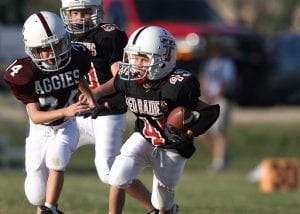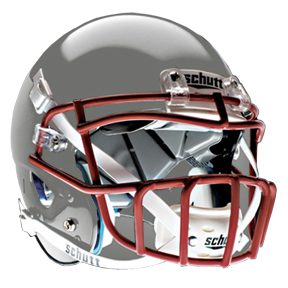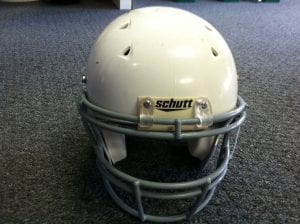Protective helmets and the kids’ overall safety.

Helmets are a very important piece of equipment when you are buying it for your little one, especially for football. There are so many things that could and may happen that could harm your youth. Youth football helmets prevents a range of head injuries like youth concussions.
Parents must take into careful consideration when buying football helmets to protect their children.
What Are The Best Youth Helmets To Prevent Concussions?
There are many teen headgears out there you can find that are listed top ten. One of the best ones and most recommended to buy is the Schutt Youth Air XP or Hybrid VTD, or Hybrid Pro VTD football headgear without a face mask (you can always order a facemask if you need to). Now, I could give you a list of which one is the best head protection and which one does not give the better protection, but instead, I can tell you what to look for when looking at headgear.
- Research the youth brands with a focus on youth concussion prevention technology.
- Look for youth helmets certified by reputable youth safety organizations like Snell, ASTM, or CPSC.
- Consider youth helmets with features such as MIPS (Multi-Directional Impact Protection System) or similar rotational impact youth protection systems.
- Read youth reviews and youth user feedback on the effectiveness of youth headgear in preventing youth concussions.
- Consult with youth healthcare professionals or sports organizations for recommendations.
- Ensure proper fit and adjustment of the youth headgear for maximum youth protection.
- Evaluate the durability and construction quality of the youth headgear for long-term use.

What Headgear Is The Safest?
When thinking about the safest and best headgear for linear and rotational acceleration on the field, you need to look at the headgear itself. Here are a few things to look out for:
Pass Safety Standards. Each headgear has to pass a safety standard. Once the headgear has passed this safety standard, the headgear receives a sticker. You should look for a sticker by the
NOCSAE or the National Operating Committee on Standards of Athletic Equipment. If you see this sticker, you know that the headgear has been proven to be safe.
Measurement Testing or Fitting. You will need to have your child try on the headgear. It has been said that a player should try on at least 3 headgears before deciding to see which one is the perfect and secure fit. One headgear that may be perfect for one player, maybe different for another. The headgear should not be too loose but make sure it is not too tight either. You don’t want to suffocate while playing this sport, even in the medium heat out there.
Outer Shell. The sport is growing in its aggressive nature. Make sure the outer shell is tough and durable, we don’t want to use one with a deformable outer shell. If you aren’t sure, make sure that the sticker is on the headgear. And always go with a new headgear, a thick and not thin one, for the rest of your practice, not just the first year. Don’t use a used one for high school youth players because young athletes need great protection the most, especially if its their first time.
Inner Padding. Although inner padding isn’t the most important aspect, your player still needs to be comfortable. Make sure the padding isn’t too soft or too hard and that it isn’t suffocating. You don’t want your football players and even coaches getting distracted by the uncomfortable fit of your accessories during their games. You might want to get one with fully interchangeable pads for easy replacing to get exceptional comfort.
Weight of the Helmet. It may seem that the ability of a lightweight one to protect seems less trustworthy, but this is untrue.
Performance of the Helmet. When considering the performance of a helmet, it’s worth noting that many lightweight options work just as well as, if not better, heavier ones, providing effective protection and better performance for a youth player. Don’t believe the notion that those with lighter weight are not that strong. Impact tests evaluate the helmet’s ability to absorb and distribute impact forces, and the ratings, represented by more stars or less stars, can guide your decision-making process. Additionally, advancements in helmet technology and features are constantly evolving, with hybrid costs for models offering a balance between helmet’s weight and protection. Be sure to research and compare the available options in the market to find the most ideal for your child’s safety needs.
Helmets Options

How Much Does Youth Helmets Cost?
A decent helmet can range in price from fifty to several hundred dollars, with quality options available for different budgets. One notable brand, Schutt, offer safe helmets that start as low as $70. While this may seem expensive for parents on a limited income, it’s important to prioritize safety. You will find ratings of Virginia Tech and information cost shown online, and some highly regarded options include the VICIS ZERO1 Youth and NFL-approved Riddell SpeedFlex helmets. Check for prices of other brands here.
How Long Do These Footballing Headgear Last?
A youth headgear can last about ten years, but the NOCSAE suggests that is stretching it. If your child had a bad hit in that headgear and received a concussion (because as much safety as there is, this still can happen), then you should get a new headgear. If the standards of youth headgear change over the years, it is suggested to change out the headgear as well. It’s better to upgrade your gears as a season pass.
- Lifespan varies depending on youth usage frequency and youth intensity.
- Youth follows manufacturer’s guidelines for youth maintenance and replacement.
- Youth should regularly inspect for signs of wear and tear, such as fraying straps or damaged padding.
- Youth considers replacing every 1-3 seasons for optimal protection.
- Youth stores youth headgear in a cool, dry place when not in use to prolong its lifespan.
- Youth be mindful of any changes in youth fit or youth performance, as they may indicate the need for replacement.
- If youth is in doubt, err on the side of caution and replace youth headgear sooner rather than later.
Are These Products Dangerous? And Are They Safe For Kids?
A headgear can be dangerous if they aren’t strong enough to protect your child’s head. If the youth headgear has been damaged by previous tackles or by some environmental accident, then it will not protect your child appropriately. If there are cracks, rips, or tears, you need to retire that headgear. If the chin strap of your boy doesn’t work correctly, retire the youth headgear. Just like car seats and other safety products, materials become weaker over time and can be harmful to your kids if worn during a sports match.
- It depends on the specific youth products in question and their intended use.
- Always read labels and youth warnings to determine potential youth hazards.
- Consider youth age appropriateness and supervision for youth.
- Consult with experts or conduct research on youth product safety.
- Look for certifications or youth safety standards adherence.
- When in doubt, err on the side of caution and seek alternatives for youth.
Youth Players

Do These Safety Gears Really Benefit Kids?
Yes! In this sport, youth headgear is being redesigned every day to only help protect and also for personalized comfort for a youth small player. It has been proven that headgear has reduced injuries through many studies. Although this piece of equipment doesn’t prevent concussion risk, it helps prevent a lot more. It is like having the best protective barrier over your brain, like your skull. If your skull was not there, then your brain would be harmed more frequently.
- Evaluate the specific youth safety gear and its intended purpose.
- Consider the youth activities or youth environments where the youth safety gear will be used.
- Research studies or expert opinions on the effectiveness of the youth gear.
- Assess potential youth risks without the youth safety gear compared to with it.
- Take into account anecdotal evidence or testimonials from other youth parents or youth users.
- Balance the cost of the youth safety gear with its youth potential benefits.
- Ultimately, prioritize the well-being and protection of the youth.
How Well Does A Youth Headgear Really Protect Against Impact?
Numerous studies have demonstrated that wearing headgear significantly reduces the risk of brain injury during impacts. This is especially crucial as children and youth undergo critical brain development. Impact tests evaluate the helmet’s ability to protect against various forces, and the ratings indicated by stars provide a useful reference. A well-designed helmet can efficiently absorb and distribute impact energy, reducing the possibility of strikes on the player’s head resulting in brain damage. In general, helmets with higher scores reduce linear forces, while a lower score from other helmets offer greater protection.
Focused Youth Player

There are security ratings to consider when you are buying youth headgear for your kid. The most imperative information to remember is that they only help your child when tackled, even if they are all small children. Anything could happen during a game, and a teen’s headgear provides crucial protection if your kid experiences head impacts from hitting the ground or colliding with another player, making safety the best concern. It is important to choose headgear with features like two layers or enhanced padding for optimal impact absorption, a more secure fit system, and advanced technology to reduce the severity of head impacts compared to traditional helmets, reducing the risk of concussions and long-term effects on the brain.
Frequently Asked Questions (FAQs):
Which Is Better, Schutt Vs Riddell?
Is Xenith Brand Good For Youth?
What is the safest football headgear in 2023?
What is the best football headgear to prevent concussions?
Is Xenith Youth X2E better than Riddell?
Is the Xenith Shadow XR Youth helmet good?
Are Schutt Youth Vengeance A3, Vengeance Pro, and Vengeance A11 good?
What headgear does Tom Brady wear?
Are Youth SpeedFlex safer?
What football headgear is the lightest?
What’s the difference between a varsity and youth football helmet?
How do I choose a football helmet?
What is better F7 or SpeedFlex?
Are Xenith helmets good?
What is the lightest helmet in football?
Why are SpeedFlex helmets so popular?
Last Updated on August 14, 2025 by Harold Chan
DISCLAIMER (IMPORTANT): This information (including all text, images, audio, or other formats on FamilyHype.com) is not intended to be a substitute for informed professional advice, diagnosis, endorsement or treatment. You should not take any action or avoid taking action without consulting a qualified professional. Always seek the advice of your physician or other qualified health provider with any questions about medical conditions. Do not disregard professional medical advice or delay seeking advice or treatment because of something you have read here a FamilyHype.com.